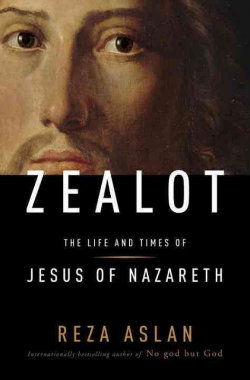 Like you and everyone you know, I heard about Reza Aslan and his book, Zealot, via that awful Fox News interview. The crazy right-wing automatic hatred of everyone with a name from a certain region baffles me. This woman hadn’t even read the book!
Like you and everyone you know, I heard about Reza Aslan and his book, Zealot, via that awful Fox News interview. The crazy right-wing automatic hatred of everyone with a name from a certain region baffles me. This woman hadn’t even read the book!
But I’m not here to talk about that interview, and I’m certainly not here to discuss my religious or political views, as neither topic makes for polite conversation.
I’d never read a historical account of Jesus’s life, and I thought that Zealot might be a good place to start. The small bit of information I did glean from the few non-nutzo, biased reviews is that Aslan doesn’t present anything new, beyond what scholars generally have to say on the subject. That’s a good thing, as I didn’t know what they had to say in the first place.
I guess I should note that I was brought up conservative Southern Baptist (with a little Catholicism thrown in), and beyond a general bitter rejection of most of what they said, I never had much of an interest in Christian history. Once I hit an age where I could begin to think for myself, I decided that the Bible isn’t supposed to be literally true, but I never bothered investigating. Sure, I have a degree in philosophy, but when I studied religion, I always found the East more interesting. So that’s where I’m coming from.
The most interesting thing, to me, about this book was how Aslan explained the difference between Jesus the historical figure and Jesus the Christ. There’s no disputing that Jesus existed, and Aslan doesn’t discuss whether he is, in fact, divine. The point here is that Jesus was a Jewish religious and political activist and that the books of the New Testament were written long after his death for a Roman audience, not a Jewish one. That’s why Pontius Pilate supposedly washed his hands of Jesus’s execution (which Aslan disputes): if the Romans were to adopt this religion, they couldn’t be directly responsible for his death. Judaism had to become a separate religion, or Christianity would remain only a sect, and Gentiles wouldn’t want to adopt it.
Aslan also discusses the motivations of the various New Testament authors and how Paul became more influential than Jesus’s brother, James, for instance, would want. Paul presented his argument to a Roman audience rather than a Jewish one like the others, and what he said became the norm.
I’ll stop there, but this stuff is so interesting! Again, Aslan doesn’t make any claims as to the divinity of Jesus or try to disprove the doctrines of Christianity: he just presents it in a historical context that you don’t generally hear from the church. At least I didn’t. Whether or not Jesus was the literal son of God, he was an intriguing figure, and Zealot is a well-written, relatively short entry into New Testament history.
If you haven’t seen that interview, by the way, it’s worth your time:
I guess I’m ending the year on a contentious note. Here’s to 50!
